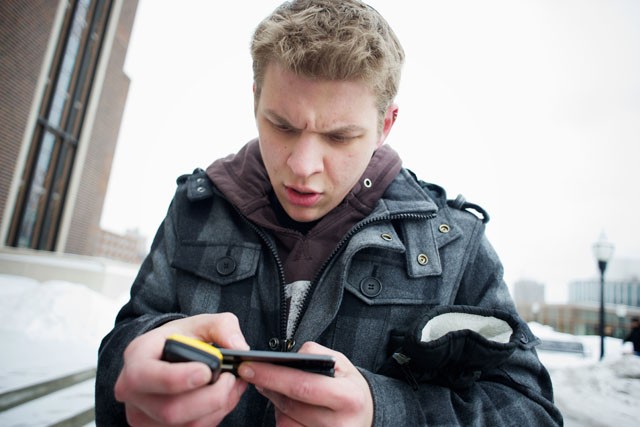Sean Fehrman doesnâÄôt have a peg leg, and is he isnâÄôt sporting an eye patch. And unlike any pirate, he has the exact coordinates to his booty âÄî no treasure map needed.
Equipped with a GPS, the University of Minnesota junior puts coordinates into the device that will lead him to within a few feet of his treasure.
The treasure Fehrman seeks isnâÄôt filled with gold coins or ancient artifacts. Rather, itâÄôs a simple box of who-knows-what.
Geocaching, a high-tech outdoor game, entails using GPS navigation to pinpoint the location of a cache as small as a tennis ball. But itâÄôs up to the seeker to find the cache at those coordinates.
In more than eight years of searching, Fehrman has found 40 caches in northern Wisconsin and Minnesota, only a meager fraction of the 1.4 million hidden by geocachers worldwide, including almost 10,000 in Minneapolis.
Last weekend Fehrman was on the hunt for a big cache somewhere on the UniversityâÄôs East Bank. Before discovering what was inside the prized cache, Fehrman needed to locate three smaller caches in the area that would eventually hint to the location of the main box.
“If I was a geocache, where would I be?” Fehrman wondered as he hopped a chain-link fence behind the University Aquatic Center.
FehrmanâÄôs GPS, purchased at an outdoor sporting store for $10, indicates heâÄôs within 50 feet of one of the caches.
Since 2000, when President Bill Clinton lifted previous restrictions on public access to a more accurate GPS system, more than 4 million participants have hunted for the caches, hidden anywhere from the UniversityâÄôs urban setting to the tops of cliffs.
Each cache, and its corresponding riddle, is posted at geocaching website Groundspeak.com.
“WeâÄôre basically a listing service for geocaches the way CraigsList is a listing service for things you want to sell,” said Jen Sonstelie, marketing manager for Groundspeak, who pointed out that the geocaches are not owned by Groundspeak.
Caches, even those hidden in the most obscure places, can be accidently found, communications sophomore Andrew Krammer said.
Krammer has stumbled upon several caches in northern Minnesota. He and some friends once found a cache inside the post of a stop sign.
Behind the Aquatic Center, Fehrman checked high and low for the cache, including looking underneath an outdoor ashtray. But the cache had yet to be seen.
After looking around, he suggested the cache may be hidden above him in the parking garage.
Most caches are hidden in the woods or in rural areas, Fehrman said. But sometimes they are hidden in structures and other urban locations.
Fehrman once went looking for a cache in an abandoned mental institution in Marshfield, Wisc., only to be greeted by police on their way out.
Public safety officials have had a fair share of contact with the caches âÄî though for them, itâÄôs unwanted.
In 2005, a suspicious box was reported in the bushes outside a Provo, Utah police department. After the bomb squad detonated the box, they discovered only toys had been inside.
Two men who claimed to have placed the box were not charged and admitted it was intended to be a geocache.
It is rare for a cache to be reported as a suspicious package, Sonstelie said.
“It sounds like very risky business,” said Minneapolis police Sgt. Steve McCarty. “ThereâÄôs safety factors involved too, if itâÄôs not trespassing.”
Fehrman has heard stories of geocachers getting injured while looking for the boxes on cliffs.
Minneapolis police do not have statistics on trespassing violations related to geocaching, but McCarty advises geocachers to stay away from property on which they may be trespassing.
In response to trespassing reports in South Carolina, the state legislature passed a bill barring geocaching in a cemetery or historical landmark without the written consent of the owner.
Groundspeak advises geocachers not to place caches around schools or any place where it may cause alarm. They recommend using clear plastic containers as caches.
FehrmanâÄôs latest pursuit is camouflaged, according to the listing description. After close to half an hour of searching on the fifth floor of the University Avenue parking ramp, Fehrman narrowed it down to a strip on the side of the parking garage, underneath at least a foot of snow.
“WeâÄôre literally on top of it now,” Fehrman said, using his hands to claw away at the snow pile.
Several minutes of digging passed without a sign of the cache.
Defeated and cold, Fehrman gave up his search but promised himself he will be back next week âÄî with a shovel.


